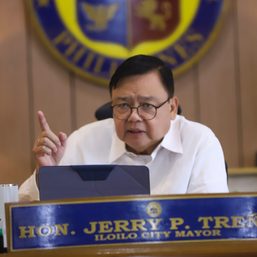SUMMARY
This is AI generated summarization, which may have errors. For context, always refer to the full article.

MANILA, Philippines – House ways and means committee chairman Joey Salceda of Albay’s 2nd District assured Department of National Defense Secretary Gilbert “Gibo” Teodoro the chamber would accommodate his requested changes to the current proposal on military and uniformed personnel (MUP) pension reform.
Salceda’s statement came days after Teodoro expressed opposition to the substitute bill that a House ad hoc panel already approved on August 15.
“Since the committee already terminated proceedings, we will introduce this as amendments at the floor instead,” Salceda said on Tuesday, August 22.
“I would like to assure the secretary that his requests are acceptable. We will adopt the Teodoro proposal of indexation for all retired and [retirement-eligible individuals] and a transitioned contribution scheme,” he added.
Here are provisions of the consolidated bill that Teodoro objected to:
- blanket mandatory contributions for military personnel, especially for those who have already completed at least twenty (20) years of active service
- tweaks to indexation
According to the substitute bill, indexation in the fund would be retained, which means pensioners would be guaranteed an increase in pension for 10 years, but it would be limited to 50% of the salary increase.
The proposal also noted that MUPs would now contribute to the fund on a staggered basis. For active personnel, it would be 5% for the first three years, 7% for the next three years, and 9% thereafter. For new entrants, it would be 9% from the get-go, but the government would have a higher share to complete the 21% contribution.
Salceda said he is seeking clarification on what exactly Teodoro’s proposal is on contributions.
“We are hearing clarifications that they just want to ensure that those who have given 20 years of service or more will not pay contributions or be subject to lower indexation. Our initial impression from the statement is that they don’t want anybody from the active service to pay any contribution or to give up any amount of indexation,” he added.
Salceda appeals to the executive branch
Salceda expects the Department of Finance (DOF) to have issues with Teodoro’s proposals, so it’s a matter that they have to “settle in the Cabinet.”
“There could be some pushback from the DOF and the economic managers on the Teodoro proposal. So, we hope that within the executive, they will sort their position out,” Salceda said.
“I need a figure that still allows me to protect the reform’s three guarantees: guaranteed salary increase, guaranteed pension increase, and guaranteed funding source. So, moving forward, any additional proposals should bear the costs in mind,” he added.
Teodoro previously insisted that Armed Forces of the Philippines (AFP) personnel have a mandate that is unique from other uniformed personnel.
“Despite wearing uniforms and ranks similar to that of other uniformed personnel, there is no uniformity in terms of the nature of their duties and responsibilities,” he said.
Other proposed reforms
Other key points in the consolidated House proposal on the MUP pension reform include:
- There would be two separate pension management systems: one for the AFP and one for civilian uniformed personnel.
- The maximum retirement package would be raised to 90% based on the base pay of all MUP.
- All active personnel would get a 3% annual salary increase.
- The retirement age would be fixed at 57 for all MUP.
- Personnel would still be promoted one rank higher upon retirement.
- Philippine National Police (PNP) personnel who served for less than 20 years would be eligible for separation lump sum.
- There would be a window in the trust funds dedicated to indigent pensioners.
The national government fully funds the pensions of MUP, but the cost has taken a toll on the government, risking a fiscal collapse.
Military pension spending in 2022 reached P164 billion, already outpacing maintenance and other operating expenses as well as capital outlays.
The military has had serious apprehensions toward past proposals, and the government risks the possibility of mass early retirement among MUP should they find pension reform disadvantageous to them.
Nonetheless, Marcos has made MUP pension reform a priority measure of his administration. – Rappler.com
Add a comment
How does this make you feel?






There are no comments yet. Add your comment to start the conversation.